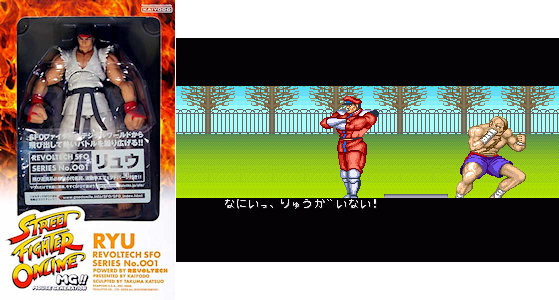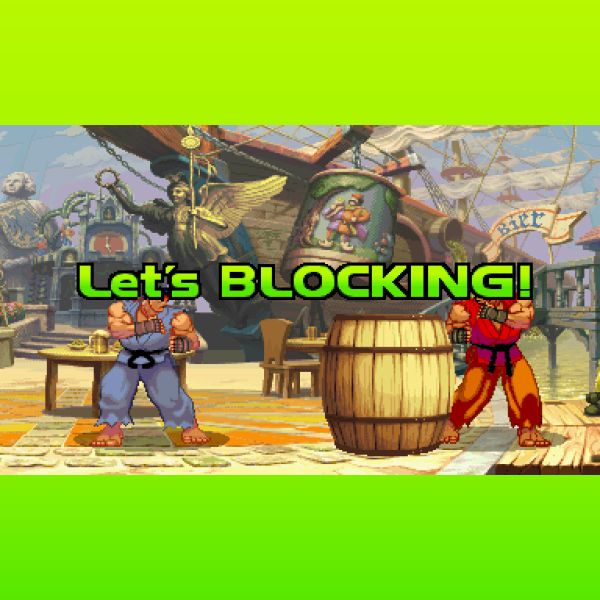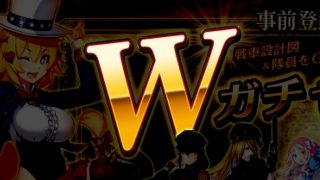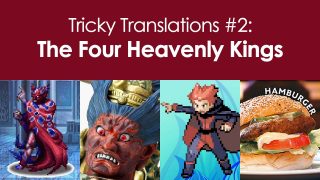I was a big fan of Street Fighter II back in the 90s, and one of my fond memories of it was being confused by how to pronounce different names and words in the game. I wasn’t alone though, and one in particular that has consistently stumped players outside of Japan is “Ryu”.
Many players feel it should be pronounced one way, while others say, “No, no, it should be pronounced THIS way.” And other people have yet other pronunciations of their own. So, at the risk of adding to the confusion, let’s take a quick look at Ryu’s name and try to get to the bottom of it once and for all!
First, Ryu’s name is spelled リュウ in Japanese. It can sometimes be spelled りゅう too, which is basically the same thing.
 |
One of the really nice things about the Japanese language is that anything written in kana like this only has one possible pronunciation. There’s no ambiguity or anything at all when spelling things in kana – it makes me wonder if Japanese schools even have our style of spelling tests at all. (I know they have kanji tests, but that’s a different story for another time…)
Anyway, when spelled in English, リュウ becomes something like “Ryu” or “Ryuu”, depending on your preference. The problem with this is that “y” in English can be either a consonant or a vowel, while in Japanese it’s almost usually a consonant. So here’s what this means:
- Ryu doesn’t rhyme with “die, you”
- Ryu isn’t pronounced “roo” – the “y” isn’t silent
- Ryu isn’t pronounced “ree-uh”, the “u” is pronounced “ooh”
If you ever enroll in a Japanese class, you’ll probably learn how to pronounce this name within the very first day – pronunciation rules are that simple and set in stone. Here are some native speakers saying it out loud for reference:
I guess the easy, cheat-sheet way to say his name is “ree-ooh”. It’s just an approximation, but if you were to say that to a Japanese speaker who knew Street Fighter stuff, they’d almost certainly know who you’re talking about.
But if you want to get closer to the proper pronunciation, say “ree-yooh” but with the “ee” part shortened. Listen to the voice clips above for some guidance too.
Actually, you know the “shoryuken” technique in the game? Just say the “ryu” part and there you go! I actually always wondered if it was a coincidence that “ryu” and “ken” were both in that attack name, since both Ryu and Ken can use it. I stopped playing after Turbo II, although I played some of IV a while back, so I’m not really caught up on my Street Fighter lore. I can’t remember how the movie pronounced it either, but I don’t really want to go watch it again to find out.
Anyway, hopefully that explains things a little bit. I’m sure some players have their preferred pronunciation they’ll always stick by, and maybe some localized versions of some Street Fighter games might use different pronunciations, but at the very least this is how Ryu’s name was originally meant to be pronounced and how it’s pronounced in Japan.
In the end, getting the wrong pronunciation isn’t a huge deal anyway, though – people often mispronounce or misspell my name, for example, but as long as the intention is clear that’s what really matters.






I already knew about Japanese pronunciation before reading this, but even despite that I found it really interesting. IT’s one of those types of things that I personally have trouble pronouncing correctly, even knowing how it’s supposed to sound. Listening to the voice clips you provided, I can tell it probably just takes practice, just like anything else in learning a language.
Also despite it all, I find it annoying when English speakers use one of those totally incorrect pronunciations you listed above, but the worst part is, they’re completely right under the rules of English pronunciation, so you can’t really tell them that they’re wrong! xD
You most certainly can tell them that they are wrong, as it’s not an English name.
That’s like somebody calling “Tokyo” “too-kai-yoww” and then claiming that “you can’t say I’m wrong” because it fits under the rules of English pronunciation. That’s a bunch of nonsense.
Wow, I got first. I almost always get ninja’d for first since I actually try to put thought and meaning into my posts while everyone else goes in while they have the chance and shouts, “OMG FIRST!!! LOL!!!”. Just saying. Yay!
I’ve heard that people have difficulty with your name — to-MAY-to, to-MAH-to. Let’s call the whole thing off.
Heh, ‘Ryu’ is simple enough. But how many people do you think can correctly say TATSUMAKISENPYUUKYAKU!
Let alone at the speed some of the games do it…
TASMACKSEPRRRUKYU
“I’D LIKE SOME POUND CAKE!”
It’s “Rye-oo” in the live action SF2 movie, “Ree-oo” in the animated one. At some point Capcom decided that superb English voice acting would be a fun thing to have, and recent games like Street Fighter 4 and Marvel vs. Capcom 3 get it right. MvC3 especially shines; most characters have a complete set of voice clips for calling in team members, usually by name, and those who do all get it right as well. Hiryu’s name too.
I’m going to be mad if that first one is rai-uu.
Unfortunately, no one could be bothered to also inform the VAs that Hsien-Ko is pronounced “syen-ko”, not “hee-sen-ko”, “shin-ko”, “sheng-ko”, “sin-ko”, “sign-ko” and however else they pronounce it.
Thanks for answering my question. There’s a video on youtube that shows many uses of his name in a Japanese cartoon. The “r” actually sounds more like the “d” sound.
The Japanese “r” is typically pronounced with a very light roll which makes it sound somewhere between an R and an L.
As someone with a rolling R in his native language, it seems to me like there’s no relation between L and R whatsoever in pronunciation. Maybe it just seems that way.
I wouldn’t consider it as a roll since rolls usually involve more than one tick. I would say it’s flipped since Japanese r’s (at least in normal conversation) very rarely have more than one tick.
I’ll have to try and break a lifetime of mispronunciation. I wonder how a name pronounced “ree-ooh” ended up spelled as “Ryu” in English…I know English is full of weird nuances and caveats, but I can’t think of anything remotely close to this type of spelling/pronunciation. I would have gone with….Rheo! like Rhea and Rodeo.
I always used to say it ‘Rai-yu’, but somewhere along the line I trained myself out of it… Also used to pronounce Sagat as ‘Sagget’, which had the unfortunate side effect of causing me to think of Bob Saget almost every time! Such a strange ’90s childhood I had…
Ha, oh man, I still say it the Bob Saget way too. That’s another name I need to unlearn sometime.
I remember when Cracked still had a magazine. The first issue I ever bought was #109, the “Video Game Special”. It had a parody of the Street Figher II movie, and at one point Guile went up against Sagat, only to attack Bob Saget instead. I forgot the reasoning behind that, but the point is that the Sagat/Saget connection wasn’t lost on whoever wrote the Parody.
I still have a habit of saying “Saget” too, plus “Veega” for Vega and “Zangeef” for Zangief.
This reminds me of the camp 90s movie. I heard that while all-American Guile has such a thick Belgian accent (I suspect Van Damme was exaggerating it), he’s the only one capable of pronouncing Ryu correctly. Even though pronouncing it right is elementary Japanese. I can totally forgive Ryu’s actor mangling the attack names in the arcade game, though, as pronouncing such long (comparatively) names in such a short time can be hard.
Unfortunately, I don’t remember how I used to pronounce Ryu. But this reminds me of the Angry Video Game Nerd video on Ninja Gaiden, where he says the only kids who pronounced it correctly (instead of Gay-din) were those who watched The Wizard.
Sometimes I have fun by looking at screenshots and try to translate them, without looking at your translations. I almost never succeed, especially when kanji is involved. Even so, when I can easily translate, “What?! Ryu’s not here!”, I get almost disappointed.
I can barely even hear the first consonant in those clips. They sound like “ewww”. 😛
Haha, yeah, it’s like a combination l and r and d. If anything I feel bad for Japanese speakers who have to try to learn the l and r sounds :X
Fun fact: the Street Fighter announcer never mentions any of the characters’ names until the console version of Alpha 2. This is probably one of the reasons why of the factors that led to people mispronouncing Ryu’s name all the time.
http://youtu.be/ba54-XgB2cs?t=1m32s
Wrong. Go to “Super Street Fighter II” and play in two player mode. (In one player mode the announcer just says “You win”/”You lose”) There you have it: The characters’ names.
I just started watching the Street Fighter Alpha movie on Netflix (entertaining, fun movie by the way), and they pronounce it “Ree-you” with the “Ree” part being shorter. I’m not sure if that’s wrong technically, but this might be the only official English pronunciation (although the actual games might actually, I haven’t played many of the newer ones).
Interesting read, though I think that it’s only natural that people from, say, America, to pronounce foreign words differently from how they are actually pronounced. It’s just part of the language barrier. Try to get a native English speaker to correctly pronounce the German word “Streichholzschächtelchen”, for example. You will probably sit there forever trying to teach the guy how to say it. That’s why I don’t really mind foreign people making obvious mispronounciations. If they, however, mispronounce names that are supposed to be for audiences in their own language (e.g. Pokémon names), then that’s a completely different story…
I think I sprained my tongue training to say that, and I’m usually pretty good at pronouncing stuff.
Oops. I meant to write “it’s only natural FOR people from, say, America,” of course.
One of the positives of growing up Mexican-American is that learning both English and Spanish simultaneously gives you a tight grasp on the pronunciation of “R”. English has no variation on it, while Spanish has two: a soft one (spelled “r”) and a hard one (spelled “rr”)… both of which are different from the English one. The Spanish soft R is phonetically similar to the Japanese R/L so I learned it without a hitch. Hell, some Central American Spanish dialects have phonetically unsustainable Rs from the Japanese pronunciation.
Swype turned my “indistinguishable” and turned it into “unsustainable”. Damn you, Swype.
The connection between ‘Shoryuken’ and the characters’ names is likely only coincidental, and doesn’t even really exist in Japanese in the first place. The special attack is always written as 昇龍拳, and while Ryu’s and Ken’s names are almost exclusively written in katakana, older materials (such as the book Street Fighter II Complete File, published in 1992) establish that their names are 隆 and 拳, respectively. So while I don’t think there’s much of a connection to the word ‘shoryuken’, it does beg the question of what kind of jerks would name their kid ‘Fist’…
The Street Fighter games would in my opinion be a great candidate for a closer inspection, by the way. As a huge SF fan and Japanese/translation nerd myself I’ve dabbled a bit in it but never in any kind of organized manner. When I looked into it I was kind of surprised to see just how poorly translated pretty much every pre-SF4 Street Fighter game has been – “You must defeat Shen Long to stand a chance” is just the tip of the ice berg. Names of special moves and characters are changed for seemingly no good reason, plot points get mangled or even made up, nuance and personality expressed in a lot of win quotes get completely lost in translation, and so on… but the most noteworthy aspect is that a ton of the text was just left out of the English versions altogether.
For instance in Super SF2 Turbo, each character has somewhere between 4 and 10 win quotes, some of which are specific to certain opponents. In the overseas version each character gets 1-2 generic ones, and most of them are at best a loose translation of the original quote but in other cases completely rewritten. In SF Alpha 2 each character’s 24 win quotes was reduced to a measly 4 or so, again getting rid of character-specific quotes and such in the process. Gouki appeared as a hidden boss in both Super SF2 Turbo and SF3: 2nd Impact – in both games he has a couple of lines of dialogue before the battle, but this was completely removed in the overseas versions.
Well, the list goes on. 😛 Anyway, I think it’s pretty interesting to note that for a type of game that is generally regarded as not having much text (or at least not much that matters), what writing is there manages to be very different between the Japanese and overseas versions.
SF games are hardly the only example but it seems like Capcom’s localization efforts were kind of dodgy for a long time – but at least with SF4 it seems they’re finally trying to give fans worldwide the same experience. To the best of my knowledge the English version of SF4 has all the text accounted for and translated accurately, and even side material like character profiles and such on the official website are available in full in English. The English voice dub in the game is for my money not very good (or more to the point, not at all necessary or wanted), but it’s hard to fault the effort.
Awesome, thanks for the insight! I’ve never taken too deep of a look at Street Fighter localization stuff but always sort of assumed it was a big mess, even back in the day. It’s sounding more and more like something worth digging into sometime, I guess with just so many games and so many variations and such, it feels almost as formidable and daunting as Pokemon. Like no matter how much research and work I put into it, I just know I’ll mess everything up and the super mega experts will pick it all apart 😛
Well, I’d like to think I’m one of those “super mega experts” so let it go on record that if you ever consider going through such an endeavour, I would be more than happy to lend whatever expertise I can. I own a number of old source books and strategy guides and stuff that I could provide scans from as well (or at least readable-enough photos). Just hit me up via email or @josefaxner on twitter whenever.
I have to say though, as much as I would like to play up the importance of all this I can’t imagine it’d attract nearly the amount of ire that anything Pokemon would. 😛 In fact, one of the things that kind of frustrate me as a fan is that on the whole, the international SF fanbase is kind of ignorant or oblivious to a lot of plot/character elements largely due to lacking localizations. Of course comics, cartoons and movies kind of muddling things up haven’t helped either. Ack, now I’m starting to go on another old man rant…
“it does beg the question of what kind of jerks would name their kid ‘Fist’”
Erm, maybe an American (since, you know, Ken is listed as coming from the USA) where the name Ken is just a normal name?
Ken actually is a common name in Japan, though I think using the kanji 拳 is rare.
But 拳 (Ken) does exist as a name in Japan.
I would be interested in reading this type of article, too.
I haven’t played many of the Street Fighter games since the Zero / Alpha series, but some stuff I remember (from over 10 years ago):
In one or more of the Alpha games, the Vs. screens would just show the country’s name, whereas their Zero equivalents would contain additional information about the stage. E.g., I think Sakura’s stage had the name of the street.
In the Street Fighter II games:
Blanka’s US ending has his mother recognize him based on the anklets he is wearing, which she gave to him before he was lost AS A BABY, but the anklets aren’t mentioned in the Japanese ending.
The US ending for Cammy has M. Bison reveal that he and Cammy were lovers before she lost her memory. I think the Japanese version only said that Cammy used to work for Vega.
The US version of Fei Long’s ending added a reference to Bruce Lee and his son Brandon Lee that was not in the Japanese version.
As a joke I sometimes tend to spell Ryu “Lhu” – which in Portuguese would sound pretty close to correct. (I hang around Portuguese-speakers a lot in IRC, don’t actually speak the language.)
So, just out of curiosity, did your Street Fighter experience involve buttons, or did it have the padded “hit sensors” that you had to physically hit, hard, to punch and kick? My best memories of the game are being a scrawny 10 year old using my elbows to get enough force to beat teenagers. 🙂
I… only know of button versions. I never physically punched anything or anyone 😯
That was the crappy “Street Fighter I”. I’m pretty sure Clyde (and most other people) started with “Street Fighter II”, therefore, he doesn’t know about the pressure sensitive buttons since they didn’t appear in any further game.
Ah. I thought the y was like u in su, which often gets dropped. Yusuke is You-skay, not You-soo-kay.
/ry/ is hard in English, because we use a different /r/. It seems impossible not to say ree-YOU. But it’s easy to not have a vowel if you roll that /r/.
Ryu was always my favorite, so I used to say “Cheerio”! (cheer ryu)
Dyoo. There’s a simple way to say it. Like saying dew with a UK accent, with the D part spoken softly.
Just in case you’re still wondering, in Japanese schools there aren’t any sort of tests similar to English spelling test.
Well, the stroke order (書き順) and how to read in Kanji test might be similar in a way.
We do have tests for how to pronounce and write Hiragana and Katakana, but I suppose that’s more similar to learning the Alphabets.
Oh, forgot to mention that I’m a Japanese who’s been in elementary school both in USA and Japan.
There is no ‘ee’sound in Ryu. It’s r/l sound directly into a hard y (like y in yellow) into a long ooh. Best way to write it for native English speaker would be l’yoo.
The sound test for the arcade version of Marvel vs. Capcom had the announcer (who was American or Canadian) pronouncing some of the characters’ names two different ways. E.g., for “Chun-Li” there would be one voice sample pronouncing the “u” as “uh” and another where it was the same as the Japanese way (“ooh”). “Zangief” also had two different pronunciations. I think these were “Zane-Geef” and “Zahn-gee-eff”.